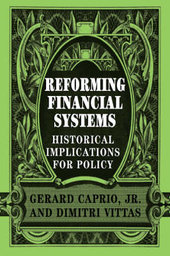
|
Reforming Financial Systems: Historical Implications for Policy
Paperback / softback
Main Details
| Title |
Reforming Financial Systems: Historical Implications for Policy
|
| Authors and Contributors |
Edited by Gerard Caprio, Jr., Jr
|
|
Edited by Dimitri Vittas
|
| Physical Properties |
| Format:Paperback / softback | | Pages:236 | | Dimensions(mm): Height 228,Width 152 |
|
| Category/Genre | Economics
Economic history
Banking |
|---|
| ISBN/Barcode |
9780521032810
|
| Classifications | Dewey:332.109 |
|---|
| Audience | | Professional & Vocational | |
|---|
| Illustrations |
20 Tables, unspecified; 14 Line drawings, unspecified
|
|
Publishing Details |
| Publisher |
Cambridge University Press
|
| Imprint |
Cambridge University Press
|
| Publication Date |
25 January 2007 |
| Publication Country |
United Kingdom
|
Description
This volume summarizes the key lessons of financial history for emerging markets and developing economies today, including the rise and role of central banks, debates on how to make banking secure and sound, the relative efficiency of universal banking compared to the Anglo-American commercial banking model, and the role of savings banks, non-banks and securities markets in development. Two lessons that should be kept in mind in reforming financial systems are the importance of incentives and diversification. Robust financial systems require incentive systems that reward prudent risk-taking and encourage sound portfolio diversification. In addition, reputation has proved to be important: central bankers must demonstrate anew why they have earned a reputation for non-inflationary policies, and private intermediaries must similarly demonstrate again why they have earned a reputation for sound, as opposed to Ponzi, finance. Attempts to reform financial systems without due allowance for the time and effort to develop institutions, including reputation, are likely to prove short-lived.
ReviewsAdvance praise: 'What a good idea to assemble a group of top financial historians and ask them to review the origins of the institutions of banking and financial policy. This excellent collection is perfectly designed for the many reflective policymakers now seeking to reform their financial systems. The authoritative treatment extends not only to commercial and central banking, but also to thrift institutions, pensions and securities markets. The authors describe both how the large degree of consensus emerged and the vigorous debates that remain: deposit insurance vs. 'depositor beware' and universal banking vs. market segmentation.' Patrick Honohan, Economic and Social Research Institute, Dublin Advance praise: 'Reforming Financial Systems by Gerard Caprio and Dimitri Vittas is an extraordinary compendium of different historical experiences with the development and regulation of the financial system. It genuinely delivers on the promise of one of its chapter titles: it provides important lessons from the past for present-day financial reforms.' Bruce Smith, University of Texas, Austin
|